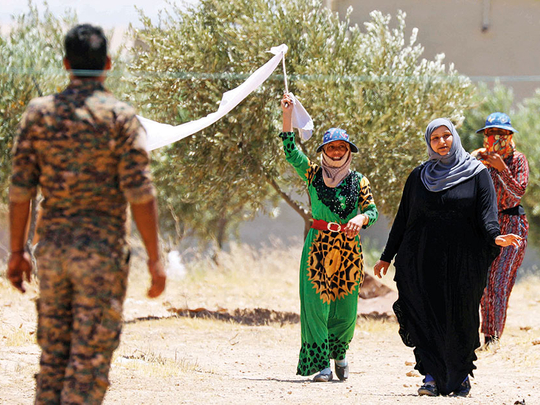
Beirut: Images and reports from witnesses in the northern Syrian city of Raqqa suggest that the US-led coalition battling Daesh there has used munitions loaded with white phosphorus, the use of which is prohibited in populated areas under international law.
Photographs and video clips posted online showed blinding spots of light spreading outward Thursday night over what residents said was eastern Raqqa. By day, the images showed low white puffs trailing tentacles of white smoke. Both are typical visual signatures of white phosphorus, which can be loaded into artillery shells.
Residents reached by text message reported similar bombardments on Friday.
The images were distributed by the Amaq news agency of Daesh, as well as a monitoring group called Raqqa Is Being Slaughtered Silently. Daesh has made claims of use of white phosphorous by US-led forces before as part of its efforts to discredit its enemies.
White phosphorus, along with other incendiaries, has been used by Syrian government forces battling insurgents in Aleppo and elsewhere.
It is not illegal under international law for militaries to possess and use white phosphorus, and the United States’ and other Western militaries say they use it mainly to create smoke screens to hide troop movements. But it can also be used as an incendiary weapon, setting off very hot fires. And like thermite and napalm, it is proscribed in civilian areas by international law.
A US official acknowledged that US forces who are fighting Daesh in Iraq and Syria have access to white phosphorus munitions, but he said it was not being used against personnel. The official spoke on the condition of anonymity because he was not authorised to discuss the use of the munition.
The spokesperson for the US-led task force that is fighting the militants, Col. Ryan Dillon, said that as a matter of policy he could not discuss the use of specific munitions. But he added that “in accordance with the law of armed conflict, white phosphorus rounds are used for screening, obscuring and marking in a way that fully considers the possible incidental effects on civilians and civilian structures.”
It has not been determined whether the shells that appeared to contain white phosphorus landed in populated areas, but tens of thousands of civilians are believed to still be in Raqqa, even as many Daesh leaders have fled south to Mayadeen in Deir Al Zor province. Unicef, the United Nations Children’s Fund, warned that 40,000 children are believed to be trapped in the city.
Residents said that most of the Daesh fighters left in Raqqa were local recruits, along with some foreign fighters, and that the most experienced commanders and fighters have moved out.
Abdullah, a Raqqa resident living in Beirut, said his relatives had seen what they believed was white phosphorus being used in the city. He also said that an internet cafe had recently been hit by missiles, killing around 20 people who were trying to reach relatives for possibly the last time after Daesh threatened to shut down all internet providers.
One of those killed in the cafe was an activist sending a report to the Syrian Observatory for Human Rights, according to the group’s founder, Rami Abdul Rahman.
Daesh has become increasingly restrictive about sharing information with the outside world, so residents spoke on the condition of anonymity for fear of reprisals.
The assault on Raqqa is being carried out by the Syrian Democratic Forces, made up of Syrian-Kurdish and Syrian-Arab militias that are receiving arms, training and air support from the United States and its anti-Daesh coalition.
Residents say they have received contradictory instructions from the coalition’s recent leaflet drops, with the latest pamphlets urging them to seek out shelters after earlier warnings to leave the city.
Doctors Without Borders issued a statement warning that civilians faced dangers, whether staying or trying to flee.
“Parents have to make an impossible decision,” an emergency coordinator with the group, Puk Leenders, said in a statement. “Either they stay in Raqqa, subjecting their children to increased violence and air strikes, or they take them over the frontline, knowing they will need to cross minefields and may be caught in crossfire.”












